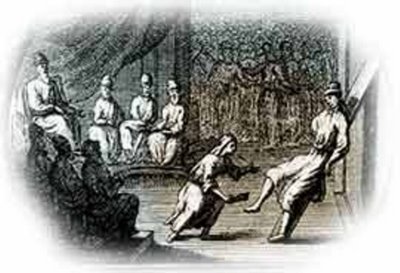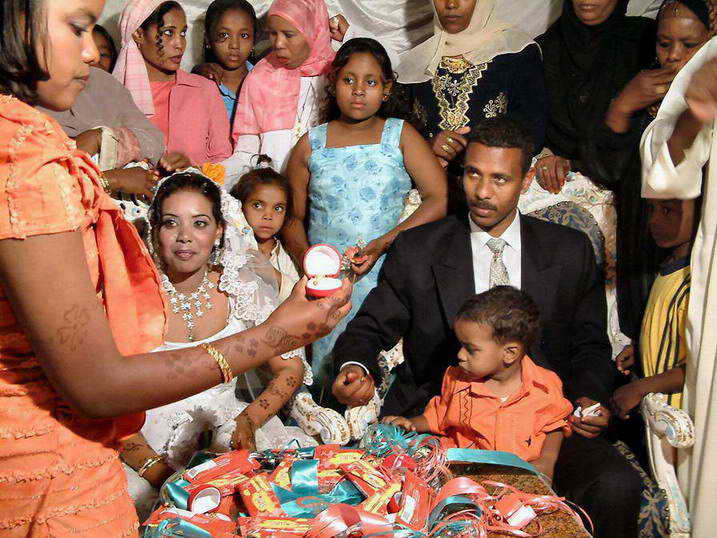|
Levirate
Levirate marriage is a type of marriage in which the brother of a deceased man is obliged to marry his brother's widow. Levirate marriage has been practiced by societies with a strong clan structure in which exogamous marriage (i.e. marriage outside the clan) is forbidden. Etymology The term ''levirate'' is derived from the Latin ''lēvir'', meaning "husband's brother;" it is unrelated to Leviticus or Levite. Background and rationale Levirate marriage can, at its most positive, serve as protection for the widow and her children, ensuring that they have a male provider and protector. Levirate marriage can be a positive in a society where women must rely on men to provide for them, especially in societies where women are under the authority of, dependent on, in servitude to or regarded as possessions of their husbands, and to ensure the survival of the clan. The practice of levirate marriage is strongly associated with patriarchal societies. The practice was extremely importan ... [...More Info...] [...Related Items...] OR: [Wikipedia] [Google] [Baidu] |
Yibbum
''Yibbum'' (, ) is the form of levirate marriage found in Judaism. As specified by , the brother of a man who died without children is permitted and encouraged to marry the widow. However, if either of the parties refuses to go through with the marriage, both are required to go through a ceremony known as '' halizah'', involving a symbolic act of renunciation of their right to perform this marriage. Jewish law (''halakha'') has seen a gradual decline of ''yibbum'' in favor of ''halizah'', to the point where in most contemporary Jewish communities, and in Israel by mandate of the Chief Rabbinate, ''yibbum'' is prohibited. In the Hebrew Bible The Torah prohibits sexual relations by a man with his brother's wife, but ''yibbum'' is an exception to this rule. The surviving brother is given a choice to take his responsibility as a goel by fulfilling the yibbum obligation, or to perform '' halizah'', though the latter choice is described by the verse disfavorably. The brother who ag ... [...More Info...] [...Related Items...] OR: [Wikipedia] [Google] [Baidu] |
Halizah
''Halitsah'' or ''chalitzah'' () in Rabbinical Judaism is the process by which a childless widow and a brother of her deceased husband may avoid the duty to marry under the biblical system of yibbum (levirate marriage) The process involves the widow making a declaration, taking off a shoe of the brother (i.e., her brother-in-law), and spitting on the floor. Through this ceremony, the brother and any other brothers are released from the obligation of marrying the woman to conceive a child that would be considered the progeny of the deceased man. The ceremony of halitsa makes the widow free to marry whomever she desires, except for a Kohen "priest". (). It is sufficient for only one brother-in-law to perform the ceremony. Yibbum () is thus modified in the Deuteronomic code attributed to Moses by permitting the surviving brother to refuse to marry his brother's widow provided he submits to the ceremony of halitsa. In the Talmudic period, this tendency was intensified by the appr ... [...More Info...] [...Related Items...] OR: [Wikipedia] [Google] [Baidu] |
Leviticus 20
Kedoshim, K'doshim, or Qedoshim (—Hebrew language, Hebrew for "holy ones," the 14th word, and the first distinctive word, in the parashah) is the 30th weekly Torah portion (, ''parashah'') in the annual Judaism, Jewish cycle of Torah reading and the seventh in the Book of Leviticus. It constitutes Leviticus 19:1–20:27. The parashah tells of the laws of holiness and ethical behavior, repeats the Ten Commandments, and describes penalties for sexual transgressions. The parashah is made up of 3,229 Hebrew letters, 868 Hebrew words, 64 Chapters and verses of the Bible, verses, and 109 lines in a Torah Scroll (, ''Sefer Torah''). Jews generally read it in late April or May. The lunisolar calendar, lunisolar Hebrew calendar contains up to 55 weeks, the exact number varying between 50 in common years and 54 or 55 in leap years. In leap years (for example, 2024), Parashat Kedoshim is read separately. In common years (for example, 2025 and 2026), Parashat Kedoshim is combined with the p ... [...More Info...] [...Related Items...] OR: [Wikipedia] [Google] [Baidu] |
Types Of Marriages
The type, functions, and characteristics of marriage vary from culture to culture, and can change over time. In general there are two types: civil marriage and Marriage#Religion, religious marriage, and typically marriages employ a combination of both (religious marriages must often be licensed and recognized by the state, and conversely civil marriages, while not sanctioned under religious law, are nevertheless respected). Marriages between people of differing religions are called interfaith marriages, while marital conversion, a more controversial concept than interfaith marriage, refers to the religious conversion of one partner to the other's religion for sake of satisfying a religious requirement. Americas and Europe In the Americas and Europe, in the 21st century, legally recognized marriages are formally presumed to be Monogamy, monogamous (although some pockets of society accept polygamy socially, if not legally, and some couples choose to enter into open marriages). In ... [...More Info...] [...Related Items...] OR: [Wikipedia] [Google] [Baidu] |
Sharia
Sharia, Sharī'ah, Shari'a, or Shariah () is a body of religious law that forms a part of the Islamic tradition based on Islamic holy books, scriptures of Islam, particularly the Quran, Qur'an and hadith. In Islamic terminology ''sharīʿah'' refers to immutable, intangible divine law; contrary to ''fiqh'', which refers to its interpretations by Ulama, Islamic scholars. Sharia, or fiqh as traditionally known, has always been used alongside urf, customary law from the very beginning in Islamic history; has been elaborated and developed over the centuries by fatwa, legal opinions issued by mufti, qualified jurists – reflecting the tendencies of Schools of Fiqh, different schools – and integrated and with various economic, penal and administrative laws issued by Muslims, Muslim rulers; and implemented for centuries by Qadi, judges in the courts until recent times, when secularism was widely adopted in Islamic societies. Traditional Principles of Islamic jurisprudence, theory o ... [...More Info...] [...Related Items...] OR: [Wikipedia] [Google] [Baidu] |
Yemen
Yemen, officially the Republic of Yemen, is a country in West Asia. Located in South Arabia, southern Arabia, it borders Saudi Arabia to Saudi Arabia–Yemen border, the north, Oman to Oman–Yemen border, the northeast, the south-eastern part of the Arabian Sea to the east, the Gulf of Aden to the south, and the Red Sea to the west, sharing maritime boundary, maritime borders with Djibouti, Eritrea, and Somalia across the Horn of Africa. Covering roughly 455,503 square kilometres (175,871 square miles), with a coastline of approximately , Yemen is the second largest country on the Arabian Peninsula. Sanaa is its constitutional capital and largest city. Yemen's estimated population is 34.7 million, mostly Arabs, Arab Muslims. It is a member of the Arab League, the United Nations, the Non-Aligned Movement and the Organisation of Islamic Cooperation. Owing to its geographic location, Yemen has been at the crossroads of many civilisations for over 7,000 years. In 1200 BCE, the Sab ... [...More Info...] [...Related Items...] OR: [Wikipedia] [Google] [Baidu] |
Ben-Zvi Institute
Yad Ben Zvi (), also known as the Ben-Zvi Institute, is a research institute and publishing house named for Israeli president Yitzhak Ben-Zvi in Jerusalem. History and activities Yad Ben-Zvi is a research institute established to continue the Zionist, educational and cultural activities of Israel's second and longest-serving president, Yizhak Ben–Zvi. It is housed in the home and offices of Ben-Zvi and his wife, Rachel Yanait, in Jerusalem's Rehavia neighborhood. Ben-Zvi founded the institute in 1947 to explore the history and culture of the Jewish communities living in Arab countries. It houses a library of manuscripts, rare books and a photographic archive, and runs an academic publishing house.A national institution Gail Lichtman for |
Chief Rabbi
Chief Rabbi () is a title given in several countries to the recognized religious leader of that country's Jewish community, or to a rabbinic leader appointed by the local secular authorities. Since 1911, through a capitulation by Ben-Zion Meir Hai Uziel, Israel has had two chief rabbis, one Ashkenazi and one Sephardi. Cities with large Jewish communities may also have their own chief rabbis; this is especially the case in Israel but has also been past practice in major Jewish centers in Europe prior to the Holocaust. North American cities rarely have chief rabbis. One exception however is Montreal, with two—one for the Ashkenazi community, the other for the Sephardi. Jewish law provides no scriptural or Talmudic support for the post of a "chief rabbi." The office, however, is said by many to find its precedent in the religio-political authority figures of Jewish antiquity (e.g., kings, high priests, patriarchs, exilarchs and ''geonim''). The position arose in Europe i ... [...More Info...] [...Related Items...] OR: [Wikipedia] [Google] [Baidu] |
Islamic Marital Jurisprudence
In Islamic law (''sharia''), marriage (''nikāḥ'' نکاح) is a legal and social contract between a man and a woman. In the religion of Islam it is generally strongly recommended that adherents marry. A ''nikāḥ'' marriage has a number of requirements and restrictions under shariah. Amongst them are that a gift known as a '' mahr'' be given by the groom to the bride; that the bride, groom and guardian for the bride (wali), give their legal consent to the marriage and that there be no coercion; that there be two witnesses from each side to the signing or accepting of the contract; that the bride and groom not be of the same gender, not be brother and sister, mother or father, aunt or uncle, or other close relatives, but may be first cousins; that the man not have more than four wives at any one time, and the woman more than one husband. Requirements and restrictions on marriage There are many hadith recommending marriage in general, but depending on the circumstances, a ... [...More Info...] [...Related Items...] OR: [Wikipedia] [Google] [Baidu] |
Mitzvah
In its primary meaning, the Hebrew language, Hebrew word (; , ''mīṣvā'' , plural ''mīṣvōt'' ; "commandment") refers to a commandment Divine law, from God to be performed as a religious duty. Jewish law () in large part consists of discussion of these commandments. According to religious tradition, there are 613 commandments, 613 such commandments. In its secondary meaning, the word ''mitzvah'' refers to a deed performed in order to fulfill such a commandment. As such, the term ''mitzvah'' has also come to express an individual act of human kindness in keeping with the law. The expression includes a sense of heartfelt sentiment beyond mere legal duty, as "you shall love your neighbor as yourself" (Leviticus 19:18). For some ''mitzvot'', the purpose is specified in the Torah; though, the opinions of the Talmudic rabbis are divided between those who seek the Teleology, purpose of the ''mitzvot'' and those who do not question them. The former believe that if people were to ... [...More Info...] [...Related Items...] OR: [Wikipedia] [Google] [Baidu] |
Quran
The Quran, also Romanization, romanized Qur'an or Koran, is the central religious text of Islam, believed by Muslims to be a Waḥy, revelation directly from God in Islam, God (''Allah, Allāh''). It is organized in 114 chapters (, ) which consist of individual verses ('). Besides its religious significance, it is widely regarded as the finest work in Arabic literature, and has significantly influenced the Arabic, Arabic language. It is the object of a modern field of academic research known as Quranic studies. Muslims believe the Quran was orally revealed by God to the final Islamic Prophets and messengers in Islam, prophet Muhammad in Islam, Muhammad through the Angel#Islam, angel Gabriel#Islam, Gabriel incrementally over a period of some 23 years, beginning on the Night of Power, Laylat al-Qadr, when Muhammad was 40, and concluding in 632, the year of his death. Muslims regard the Quran as Muhammad's most important Islamic view of miracles, miracle, a proof of his prophet ... [...More Info...] [...Related Items...] OR: [Wikipedia] [Google] [Baidu] |
Mahr
In Islam, a mahr (in ; ; Bengali: দেনমোহর; ; ; ; also transliterated ''mehr'', ''meher'', ''denmohor, mehrieh'', or ''mahriyeh'') is the bride wealth obligation, in the form of money, possessions or teaching of verses from the Quran by the groom, to the bride in connection with an Islamic wedding. While the ''mahr'' is often money, it can also be anything agreed upon by the bride such as jewelry, home goods, furniture, a dwelling or some land. Mahr is typically specified in the marriage contract signed upon marriage. "Dower" is the English translation that comes closest to Islamic meaning of mahr, as "dower" refers to the payment from the husband or his family to the wife, especially to support her in the event of his death, although subsequent to marriage the wife also acquires inheritance rights. However, mahr is distinct from dower in two ways: 1) mahr is legally required for all Islamic marriages while dower is optional, and 2) mahr is required to be specifie ... [...More Info...] [...Related Items...] OR: [Wikipedia] [Google] [Baidu] |





